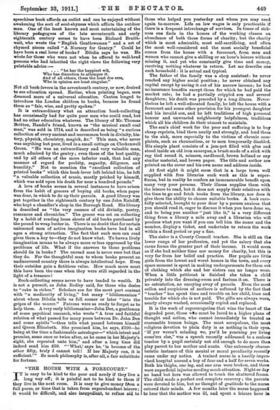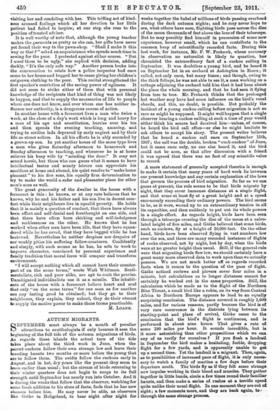"THE HOUSE WITH A FORECOURT."
TT is easy to be kind to the poor and needy if they live a
long way off; it is painful not to be kind to them if they live in the next room. It is easy to give money from a full purse, or time that is taken from superabundant leisure ; it would be difficult, and also inexpedient, to refuse aid to
those who helped you yesterday and whom you may need again to-morrow. Life on low wages is only practicable if there is a frequent interchange of services. In times of sick- ness one finds in the homes of the working classes an abundance of both these forms of charity; but the charity which is most admirable, most self-sacrificing, and often the most well-considered and the most socially beneficial comes from the house with a forecourt, from men and
women who cannot give a shilling or an hour's leisure without missing it, and yet who constantly give time and money, receiving nothing whatever in return. Let me describe one such household : it is actual and typical.
The father of the family was a shop assistant: he never reached any higher social position ; he never obtained any
capital except by saving it out of his narrow income ; he had
no insurance benefits except those for which he had paid the market rate; he had a partially crippled son and several
daughters ; his death was preceded by a long illness. Never-
theless he left a well-educated family, be left the house with a forecourt and some other provision for his youngest daughter
and his invalid son, and he left traditions of high personal honour and unwearied neighbourly helpfulness, traditions which all his children do their utmost to maintain.
The son's chief work for the poor and suffering is to buy cheap reprints, bind them neatly and strongly, and lend them to the sick, more especially to the victims of chronic com- plaints, such as rheumatism, or to men temporarily disabled. His simple plant consists of a jam-pot filled with glue and stood inside an old iron saucepan, a brush made of a stick with rag tied round it, scissors, cardboard, brown holland or any similar material, and brown paper. The title and author are printed on the cover and his own name and address inside.
At first sight it might seem that in a large town well supplied with free libraries such work as this is super-
fluous, but in reality he confers an immeasurable benefit upon many very poor persons. Their illness supplies them with the leisure to read, but it does not supply their relatives with the time to go and fetch books from the library, nor does it give them the ability to choose suitable books. A book care- fully selected, brought to your door by a person anxious that you should read it, eager to discuss it when you have done so, and to bring you another "just like it," is a very different thing from a library a mile away and a librarian who will produce what you want if you can tell him the name and the number, display a ticket, and undertake to return the work within a fixed period or pay a fine.
The sister is a County Council teacher. She is still on the lower rungs of her profession, and yet the salary that she
earns forms the greater part of their income. It would seem
as if she had neither time nor money for charity, but this is very far from her belief and practice. Her pupils are little girls from the lowest and worst homes in the town, and every spare moment is spent in making undergarments for them out of clothing which she and her sisters can no longer wear.
When a little petticoat is finished she takes a child
privately into the dressing-room and fastens it on. There is no ostentation, no carrying away of parcels. Even the most
sullen and suspicious of mothers is softened by the fact that " teacher " has spent time and trouble on her child, time and trouble for which she is not paid. The gifts are always worn, nearly always washed, occasionally copied and replaced.
It is the work of supererogation that wins the heart of the degraded poor, those 'coNt must be lured to a higher plane of
thought and action, who cannot immediately be treated as
reasonable human beings. The most scrupulous, the most religious devotion to plain duty is as nothing in their eyes.
"If yer weren't minding we, yer'd be yearning yer living some'ers else," was a speech recently addressed to a zealous teacher by a pupil certainly not old enough to do more than play parrot to her mother and aunts. One extremely charac-
teristic instance of this mental or moral peculiarity recently came under my notice. A trained nurse in a hastily impro- vised hospital nursed a boy of four and a half for seven weeks. Both his thighs, one leg, and one arm were broken, and there were superficial injuries needing much attention. Night or day no hand but hers was allowed to touch the shattered frame. The child made a perfect and complete recovery ; the parents were devoted to him, but no thought of gratitude to the nurse entered their minds. A few months later the nurse happened to hear that the mother was ill, and spent a leisure hour in
visiting her and condoling with her. This trifling act of kind- ness aroused feelings which all her devotion to her little patient had failed to inspire; at one step she rose to the position of trusted adviser.
It is well worthy of note that, although the young teacher makes the garments as pretty as she can, her gifts have never yet found their way to the pawn-shop. "Shall I make it this way or that ?" asked an acquaintance who spends much time in sewing for the poor. I protested against either course. " But I want them to be ugly," she replied with decision, adding darkly, " It's the only safe way." Another person broke into the conversation to relate how a police inspector had once come to her house and begged her to cease giving her children's outgrown clothing to the poor. This recital strengthened the first speaker's conviction of the saving power of ugliness. It did not seem to strike either of them that with personal knowledge of the recipients that kind of thing was not likely to happen, and that to supply the necessaries of life to people whom one does not know, and over whom one has neither in- fluence nor authority, is a dangerous course of action.
In another house with a forecourt lives a man who twice a week, at the close of a day's work which is long and heavy for a. man of his age and constitution, hurries over his tea and then spends the evening teaching, amusing, and trying to civilize lads depraved by early neglect and by their life as street sellers. In all his efforts he is ably seconded by a grown-up son. In yet another house of the same type lives a man who gives Saturday afternoon to housework and Sunday afternoon to teaching, and whenever he is at home relieves his busy wife by "minding the door." It may not sound heroic, but those who can guess what it means to have intellectual tastes and scanty leisure can appreciate his sacrifices at home and abroad, his quiet resolve to " make home pleasant " to his five sons, his equally firm determination to try to make the world a safer and pleasanter place for other men's sons as well.
The great generosity of the dweller in the house with a forecourt is this : he knows, or at any rate believes that he knows, why he and his father and his son live in decent com- fort while their neighbours live in squalid poverty. He holds that it is mainly a question of conduct, that there have always been effort and self-denial and forethought on one side, and that there have often been shirking and self-indulgence and recklessness on the other. He knows that he has worked when other men have been idle, that they have squan- dered while he has saved, that they have begged while he has bestowed. Nevertheless he neither despises nor despairs of nor weakly pities his suffering fellow-creatures. Confidently and simply, with such means as he has, he sets to work to improve character, convinced by personal experience and family tradition that moral force will conquer and transform environment.
" I will accept nothing which all cannot have their counter- part of on the same terms," wrote Walt Whitman. Senti- mentalists, rich and poor alike, are apt to omit the proviso. Unmitigated individualists use it as a missile. The inhabit- ants of the house with a forecourt believe heart and soul that only " on the same terms " for one man as for another can any lasting good be obtained; but they go to their neighbours, they explain, they exhort, they do their utmost to supply the motive power to make those terms practicable.
M. LOANE.







































 Previous page
Previous page